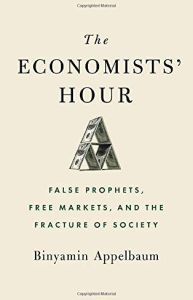Join getAbstract to access the summary!

Join getAbstract to access the summary!
Binyamin Appelbaum
The Economists’ Hour
False Prophets, Free Markets, and the Fracture of Society
Little, Brown US, 2019
What's inside?
Globalization was inevitable, but the type of globalization that hollowed out the middle class wasn’t.
Recommendation
In this insightful study of postwar economic orthodoxy, journalist Binyamin Appelbaum tells the backstory of how economists Milton Friedman, Arthur Laffer and other free market proponents captured the imaginations of Ronald Reagan, Margaret Thatcher and other world leaders. The results today, Appelbaum writes, are lower taxes for the wealthy and falling incomes for everyone else. His far-ranging analysis also explains why, for example, air travel now is cheap yet miserable, and why laid-off workers in the American Rust Belt will never again earn the incomes they enjoyed before their factories closed. Readers of all political and economic stripes will find Appelbaum’s treatise a sobering take on the modern economy.
Summary
About the Author
Binyamin Appelbaum is an editorial writer for The New York Times who focuses on business and economics. He previously was a Washington correspondent for the paper and a reporter for the Charlotte Observer.




















Comment on this summary